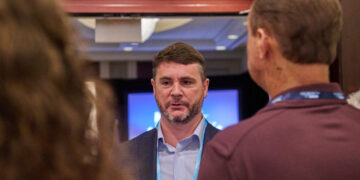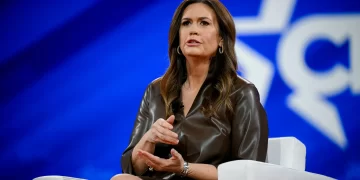
“I would rather be governed by the first 2,000 people in the telephone directory,” wrote the late William F. Buckley in 1961, “than by the Harvard University faculty.” It might be wise bearing this in mind in light of the warning just issued by The Washington Post:
If Trump is reelected, states the paper’s Karen Tumulty, he’s going to rob us of “Harvard-faculty governance.”
That’s putting it figuratively, of course. What Tumulty actually wrote is that Trump would “replace the professionalized civil service of today” with “a government of amateurs.”
In a Monday piece titled “Trump wants a government of amateurs — accountable only to him,” the philosophically tumultuous Tumulty opines:
Give him this: He has made no secret of his intention to kick over a host of institutions with that vision in mind if voters decide to give him a do-over in the White House. One plan that hasn’t gotten nearly enough attention, however, is Trump’s desire to replace the professionalized civil service of today with his own version of the 19th-century “spoils system.”
He’s already tried. Near the end of his presidency, Trump issued an executive order making it possible for him to fire tens of thousands of civil servants in policymaking positions and to install political allies in their places. It was to be done through a newly created status known as “Schedule F.”
… Trump would move quickly to reinstate Schedule F — and, no doubt, broaden it — if he is reelected.
Of course, another way of saying “kick over a host of institutions” is “drain the swamp” — which is precisely what many voters want.
Moreover, Tumulty’s claim is comical, notes commentator Jack Hellner. “I am having trouble locating the principled professionals hired by Biden,” he wrote Wednesday, “who also disagree with Biden and his radical policies, because as I see it, Biden hires are the epitome of ‘political allies.’” For sure — they operate as a hive mind.
But Tumulty isn’t alone in revving up the laugh meter. In a Politico “Playbook” interview last weekend that Hellner quips could pass for a Babylon Bee piece, Kamala Harris criticized Trump for selecting running-mate short-list choices who all support him and his policies. My, what a radical. She claimed Trump just wanted an “enabler.”
Of course, the immediate question to Harris from a conscientious media would’ve been: “If that’s how it’s meant to be, would you please name a few issues or policies on which you disagree with Joe Biden?”
She would’ve stammered and sputtered worse than journalist Francesca Fiorentini did recently when pressed to explain what “crime” Trump was convicted of in New York.
Mentioning that appointing people who’ll advance your agenda is what all presidents do, Hellner went on to illustrate that dissent is wholly absent in the Biden administration. This is obvious, though. More interesting is a deeper issue.
That is, what does “professionalism” or “expert” status really denote?
Being a “professional” simply means that a person does something as a profession; it doesn’t guarantee competence. Why, in the early days of golf and tennis, for instance, the “amateurs” often surpassed the “pros” (e.g., Bobby Jones in golf).
Of course, we’d hope that doing something as a career would yield true expertise, but is this always so?
Question: How many Supreme Court decisions are 5-4? Many. So while all nine justices are supposedly juridical experts extraordinaire, in some cases they’re split as close to 50-50 as possible.
Will the real experts please stand up?
This isn’t unusual. On many if not most issues — and all controversial ones — you’ll find “experts” on both sides. The only exception is when the issue has more than two sides; then there are experts on all of them. To which “experts” do you listen?
Making this determination even more difficult is that even brilliance doesn’t immunize one against gross error. Just consider that “Albert Einstein predicted: ‘There is not the slightest indication that nuclear energy will ever be obtainable. It would mean that the atom would have to be shattered at will,’” related late Professor Walter E. Williams in 2017.
“In 1899, Charles H. Duell, the U.S. commissioner of patents, said, ‘Everything that can be invented has been invented,’” Williams continued. “Listening to its experts in 1936, The New York Times predicted, ‘A rocket will never be able to leave the Earth’s atmosphere.’” (Williams provided numerous other examples, too.)
Experts become more errant still when government gets involved. As Williams’ college mentor, economist Milton Friedman, pointed out when contrasting the market with top-down control, government hires are appointed based on “political self-interest.” Ergo, keeping their jobs depends on deferring to political imperatives, not expertise-oriented ones.
A good example is Covid, about which government “experts” — whose prescriptions were most errant — routinely contradicted private-sector experts. Epidemiologist Knut Wittkowski explained the disagreement simply in 2020. “Well, I’m not paid by the government,” he said, “so I’m entitled to actually do science.”
As for Biden’s “experts,” what have they wrought? A short list:
- Alejandro Mayorkas, the secretary of Homeland Security, will not secure the homeland and seal the border.
- Pete Buttigieg, the secretary of Transportation, knows little about transportation and is most famous for being homosexual and talking about “racist roads.”
- Sam Brinton, ex-Office of Nuclear Energy official, is best known for dressing like a woman (an androgynous alien, actually) and stealing luggage.
- “Rachel” Levine, U.S. assistant secretary for health, is a man who masquerades as a woman and advocates “transgenderism” for children.
Be warned, too: Reelecting Trump means sacrificing this kind of expertise.
And now we can understand why the ancient Athenians chose their “representatives” based on lot, saying they wanted common men in the roles and not “professional politicians.”
As for Trump, why wouldn’t his and his supporters’ focus be on cleaning house? Remember when The New York Times published a 2018 piece on the “resistance inside the Trump administration,” written by a self-professed member of the “steady state” (aka the “deep state”)? The MAGA movement is not mainly about Trump, but concerns transforming government.
In conclusion, it shouldn’t be surprising that Trump would demand at least a modicum of the total loyalty Biden receives from the (hopefully no longer) permanent bureaucracy.
Well, strike that: It may be surprising to certain “experts” on government and “professionals” specializing in human behavior.
Shop For Night Vision | See more…
Shop For Survival Gear | See more…
-
Sale!

Quick Slow Release Paramedic Survival Emergency Tourniquet Buckle
Original price was: $14.99.$7.99Current price is: $7.99. Add to cart -
Sale!

Portable Mini Water Filter Straw Survival Water Purifier
Original price was: $29.99.$14.99Current price is: $14.99. Add to cart -
Sale!

Mesh Shooting Hunting Vest with Multi Pockets
Original price was: $59.99.$39.99Current price is: $39.99. Add to cart

































 Reaction & Commentary
Reaction & Commentary












